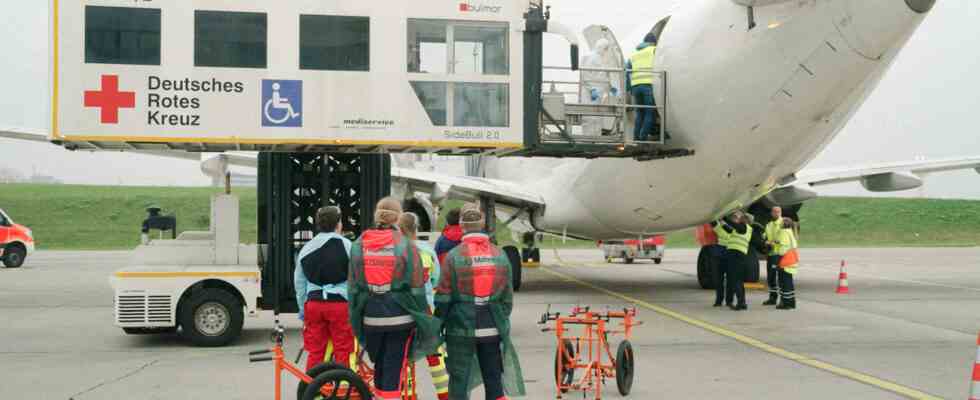Status: 02/13/2023 12:57 p.m
Mines, grenades, projectiles – the injuries suffered by Ukrainian soldiers and civilians are often complex and difficult to treat. Germany is also helping. However, it is often a long road to recovery.
Yevgeny has been in the Bundeswehr hospital in Hamburg for months. He is missing 15 centimeters of bone in his shinbone since a Russian mortar shell fell next to him in the spring. Now the doctors are trying to save the leg of the 48-year-old from Kiev.
With the beginning of the Russian war of aggression, the father of two sons volunteered to be a soldier. In the first few days, he and his unit of volunteers defended the strategically important Kiev Zhuliany airport. After the Russian attackers withdrew from the area around the capital, his unit was transferred to near Kharkiv in eastern Ukraine.
Injury from a fragment of a grenade
There Yevgeny fought in a mortar unit. In a village his unit was attacked. They defended themselves, says the 48-year-old. Some of the Russian soldiers killed them, but then they ran out of ammunition.
“I called out to my comrades: Take cover,” he recalls. “But it was too late for me.” A grenade fell next to him. A fragment penetrated his lower leg and shattered his tibia bone. His comrades took care of him and probably saved his life. “The grenade could have killed me too,” says the Ukrainian. “War is like gambling.”
Yevgeny has been in the Bundeswehr hospital in Hamburg for months. Lucky for him that he survived.
Image: Andrzej Krol
No evacuation flights from Ukraine
Like Yevgeny, around 1,600 wounded were brought from Ukraine to the European Union last year – civilians and soldiers. More than 600 of them came to Germany. The Federal Office for Disaster Control coordinates the distribution of the wounded in Germany as a contribution to an emergency aid program of the EU. Ukrainian hospitals can also request support for specific patients.
If there is free capacity in hospitals within the EU, the patients are taken to Rzeszów in Poland and flown out from there in collective transports. There are no direct flights from Ukraine because of the threat of Russian missiles.
Patients like the soldier Yevgeny therefore have a long journey behind them. The 48-year-old was first taken to a hospital in Kharkiv, then to a hospital in Poltava in central Ukraine. From there they drove almost 900 kilometers to the west of the country and only then across the Polish border to Rzeszów Airport.
Distribution to many hospitals
Initially, the evacuation flights to Germany were organized by the Air Force, but now a special aircraft from Norway is used for the EU-wide flights. In the Boeing 737, the wounded are transported lying down and can receive medical care during the flight. The Norwegian armed forces provide the medical staff.
Hamburg Airport is the starting point for groupage transports to northern Germany. There, head of operations Martin Karminski from the Hamburg fire brigade organizes the arrival and further distribution of the wounded. They are taken to hospitals by rescue services – for example to Schwerin, Kiel or Hanover.
How many wounded arrive per flight varies, says Karminski. There were more than 30 on one of the first flights in spring, and eight on an arrival in November. There were a total of eight medical flights to the Hanseatic city last year.
Hospital treatment is just the beginning
When the patients arrive in Germany, they have often already had several weeks of treatment in the Ukraine and are largely stable. It was the same with Oksana, who was seriously wounded in eastern Ukraine at the end of March and came to Hamburg in May.
The pediatric nurse stepped on a mine in her hometown of Lysychansk on her way home from a school where relief supplies were being distributed. “I fell face down on the ground and couldn’t breathe,” says the 24-year-old. “I didn’t feel my legs. It felt like they were in a hole.” Oksana lost both legs and four fingers on his left hand.
In Germany she gets her first prostheses and learns to cope with her injuries in everyday life. It’s a long process. In the months following an amputation, the leg stump is constantly changing, water is retained and the muscles atrophy. Therefore, the prostheses have to be changed and adjusted frequently.
Learning to walk: Oksana’s husband helps her practice.
Image: Dennis Wienecke
Still months until the first step
Yevgeny will also need patience, his treatment in the Bundeswehr hospital in Hamburg is lengthy. In the meantime, the 48-year-old was even released. A multi-resistant germ had spread to the wound. It was not possible to operate until it had subsided. A difficult time for Yevgeny. At the time he thought that if the shrapnel had been bigger, his leg could have been amputated. “And then I might have been able to walk around with a prosthesis right away,” he says.
But after a long wait, the germ subsided. In February – after more than half a year – he can be operated on. The doctors put an implant in the healthy part of his bone to ensure that the shin bone grows back. That takes time. Bone grows just a millimeter a day. It will be many months before Yevgeny takes the first steps.
On Monday, February 13, 2023, from 10 p.m., NDR will broadcast a 45-minute documentary on the subject entitled “Severely wounded: Ukrainian war victims in German clinics”. The post is already in the ARD media library available.

